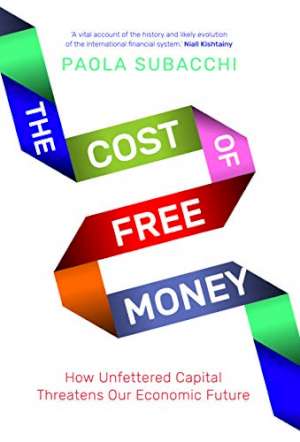08 March 2021
The Cost of Free Money
Paola Subacchi
2020, Yale University Press, 320 pages,
ISBN 9780300244045
Reviewer: Vicky Pryce

Just as we are getting used to the existence of ‘magic money trees’ which have helped finance the massive stimulus packages we have seen during the pandemic (some 12% of GDP in the UK and the US for example, so far), here comes this excellent book to remind us that there is no such thing as free money. And that money costs, eventually leaving countries, particularly those on the developing world , horribly exposed. And this extra huge borrowing, mostly in dollars, accompanied also by big capital flows, tends to create crises such as the ones we saw in Mexico and are still seeing resurfacing in places like Argentina and wider afield.
The book exposes the perils lying ahead of not getting to grips with the change in the world order, with China rising as a power and calls for a much more coordinated and rebalanced international institutional arrangement that adapts to current realities. Overdependence on the dollar is itself a source of instability. That seems to have been recognised by the EU which has recently launched a new effort to increase the international role of the Euro to better protect the region. Paola Subacchi suggests, amongst other things, that the renminbi’s role as an international currency should also be increased.
But the book goes deeper than that. If one follows its thesis, we are currently focussing on the wrong thing - trade. It is indeed true that we are obsessed with trade right now - not just in the UK with the worries post-Brexit but the entire world trade order which came under attack by President Trump. Moreover, not only have we witnessed a move away from multilateral to sub-optimal bilateral trade agreements in the last couple of decades, but as the WTO itself has shown, protectionism, particularly in the form of non-trade barriers, seems to be on the rise. And we are also faced with the disruption of trade volumes during the pandemic with considerable supply shortages and with supply chains left seriously affected. The consequences for the world economy have been significant given that countries have become so interlinked in recent years with trade reaching some 60% of the value of global GDP by the end of 2019. And the pandemic has also put into question the whole trend to globalisation with talks of on-shoring and the placing of increasing barriers to movements of goods.
There is a risk that the recent swing to nationalism will obscure the fact that globalisation has moved hundreds of millions of people out of extreme poverty , led to greater choice and more affordable prices for the consumer and made getting inflation under control that much easier for central banks. But as Paola Subacchi argues in this book, though trade flows matter, this this is not where the sickness lies. It is, instead , free flowing capital which has, in her view, been at the root of the economic and political crises we have witnessed- and are still witnessing. Unfettered capital movements, taking advantage of changing relative positions, can wreak havoc, particularly in developing countries. Speculative activities fuelled by greed end up destabilising economies and political systems and cost us all dear. Paola Subacchi quotes an OECD estimate that after periods of large capital flows the probability of a banking crisis increases fourfold.
So what is the solution? Do we go back to some sort of capital controls? That was certainly an oft- repeated theme before the pandemic struck. Reading the book I suspect that, if done with care, that seems to be where the author’s inclination lies, as that would at least limit the scope for destabilising speculative flows. And she would also add to her wish list a new international tax framework to remove tax loopholes to reduce incentives for tax elusion and tax evasion which are behind some of these flows and an international ‘green deal’ to ensure environmental sustainability. But she doubts these changes would happen any time soon to create a new ‘Bretton Woods’ which she thinks the world urgently needs. But whatever progress is made in these areas, even if painfully slow, does not detract from the main message in the book - that we need a more resilient institutional framework that takes account of the changing balance of power around the world and which binds China in, as China ‘going solo’ would ,as she says, ’spell serious trouble’. We have been warned.
But is Paola Subacchi perhaps too much of a pessimist? The book was written while Trump was still in power and the Biden victory might change that. Covid has in some ways strengthened the determination to tackle climate change more consistently. And thinking of different ways to regulate and better tax international companies that take advantage of preferential tax loopholes is gathering pace. Here’s to hope…
